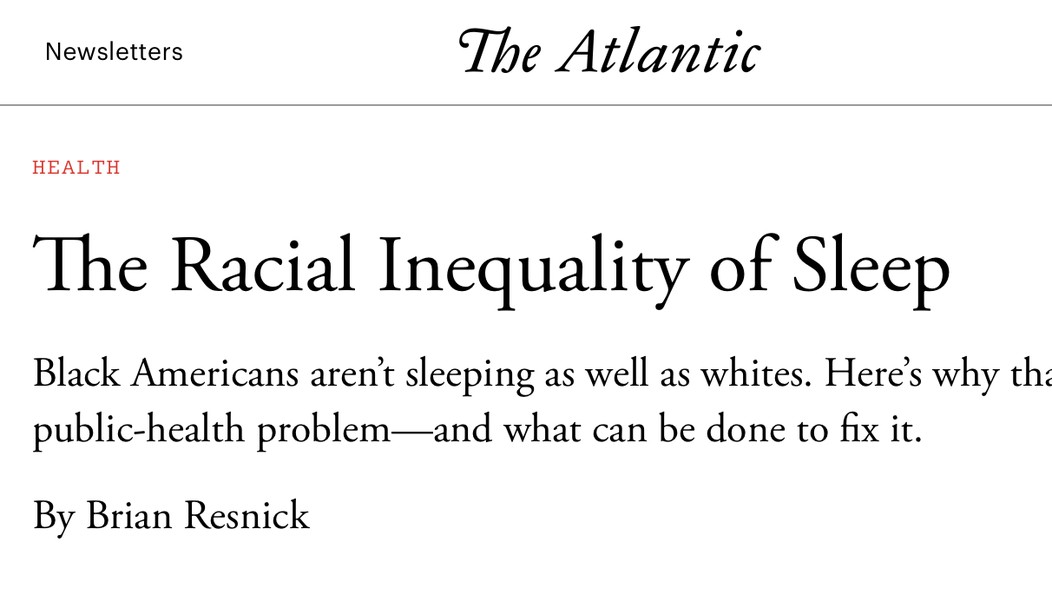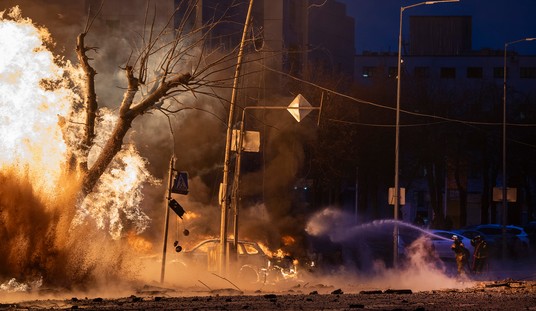The other day I wrote a piece about my journey to getting a replacement for my dying CPAP, so you can understand my interest in all things sleep-related.
If you have ever had insomnia, sleep apnea, or any of the sleep disorders out there, you know how important getting good sleep really is.
So I took notice when somebody tweeted out a screenshot of an Atlantic article linking sleep deprivation to racism in America. I almost immediately started writing a piece to make fun of it mercilessly, until I noticed it was years old. So I put it on the back burner and decided to do a deeper dive into the topic.
A deep dive one can do, too. It turns out that there is substantial literature out there that claims that racial oppression causes sleep deprivation and that White Supremacy is somehow reducing the sleep quality of Black people.
First things first: research apparently shows that Black and White Americans display different sleep patterns and that on average Black Americans are more likely to be sleep deprived than White Americans. They are also more likely to sleep excessively. In the great bell curve of sleep duration, Blacks are more likely to be outliers on either end.
That seems an interesting result and certainly points to the need for physicians to pay special attention to demographics in diagnosing patients. This, it seems, would be uncontroversial. Doctors should look especially hard for a disease where it is most likely to arise, and just as Black people are more likely to get sickle-cell anemia and multiple myeloma than Whites, it makes sense to be aware of that as well. It’s just smart medicine.
It also makes sense to look for reasons why the problem exists. Why do Black Americans get less sleep, and can we do anything about it? Prevention strategies are often viewed as a holy grail for obvious reasons, although experience shows that changing behaviors if necessary is a tough task. We see this with smoking, obesity, drinking, etc. But there may also be environmental factors that are easier to deal with, so it makes sense to find them.
Well, a growing consensus in medicine for the real cause has arisen: it is White people’s fault.
Because of course it is. Racism…is there anything bad it doesn’t cause?
Historically, sleep has been elusive for African Americans. From being shackled together en masse in the bowels of a slave ship, lying down, side-by-side, head to foot or even closer, with very little air flow and extremely unsanitary conditions, to living in tight quarters on a plantation, being worked from “sun up to sun down,” fear and terror, to the belief that African people “require less sleep,” African Americans have a long history of sleep deprivation and disruption. Unfortunately, the consequences of a history of structural and systemic racism on sleep and sleep-related health outcomes are relatively unknown.
Okaaaayyyyy. I guess that explains it. Slave ships and slavery. It is so obvious that a piece in the American Journal of Managed Care began:
A panel of experts at the SLEEP 2022 conference argued against considering race a risk factor for health complications and disrupted sleep, saying that being on the receiving end of racial discrimination is the true risk factor.
Yeah, well, probably not. It seems to me that there are more likely explanations. The Sleep Foundation provides a list that still includes racism, but at least is a bit more plausible:
Examples of potential contributors to sleep-related health disparities cited by those who have studied the issue include:
- Shift Work: People of color are more likely to work night shifts or irregular or extra hours that can throw off their sleep schedule and their ability to sync their circadian rhythm with the local day-night cycle.
- Occupational Hazards: Many people of color report job stress from discrimination in the workplace. In addition, it’s more common for people of color to work in jobs with greater safety risks that can create stress or occupational exposures to allergens or irritants that may increase their susceptibility to sleep apnea.
- Racial Discrimination: The issue of police brutality illustrates only one aspect of racial discrimination that can have far-reaching effects on a person’s health. Fear, anger, and sadness related to racial discrimination are a major stressor for many people of color, and studies have uncovered an association between perceived discrimination and lack of sleep.
- Financial Stress: A higher percentage of people of color face unemployment and poverty, both of which can create financial pressure and significant day-to-day stress.
- Neighborhood Environment: Neighborhoods with a higher percentage of people of color often confront higher levels of pollution, noise, allergens, and other potential stressors and contributors to poor sleep and sleep apnea.
- Acculturation: For ethnic groups, especially those made up of significant immigrant communities, the process of adjusting to dominant culture in America can be a source of tremendous stress and anxiety that may influence sleep quality.
Most of the things on the list would seem to have some relationship to the problem, especially shift work.
Except for one thing: the problem has been getting worse, not better, over the decades. And the problem is worse for Black people with higher incomes than those with lower incomes.
The Yale-led team reported that, in 2018, the percentage of people reporting short sleep duration was 11 points higher among Black people when compared with white people. The same disparity was 7.5 points in 2004. They investigated how these findings varied by sex and household income and found that the disparities were the highest for Black women and Black individuals with middle or high income.
The problem is more prevalent in young Blacks than older Blacks, also suggesting that racism is not the problem, nor the legacy of slavery. Racism was a bigger part of people’s lives if they lived through the 50s and 60s than for an 18-year-old, so why do they sleep better than the kid?
This doesn’t seem to suggest that financial stress, living in urban areas, or shift work are the dominant causes of the problems. And it seems implausible that racism has increased substantially since 2004. Quite the opposite. Something else is at play.
I frankly admit that I don’t know what that something is, but it doesn’t seem plausible that any of the reasons set out by the race-mongers has hit on it. Worse, their obsession with anti-Whiteness and structural racism is likely leading them to look in the wrong places. If you find the problem is worse in middle and high-income people, shift work is likely not the answer and urban problems are less likely as well.
What else could be at play? Probably not genetics because the problem is growing and not constant. It makes sense to do research and find out, but if you start with the belief that the underlying cause is racism, you will end with the conclusion that it is. And since that is now a bedrock principle in medical and social science, good luck finding the answer.
I did learn a few things in my deeper dive: 1) there is a divergence in sleep patterns that correlates with race; 2) scientists these days always claim racism is the cause of any bad thing; and 3) because of 2, we won’t learn the real reasons until somebody with intellectual integrity looks at the problem with fresh eyes.








Join the conversation as a VIP Member